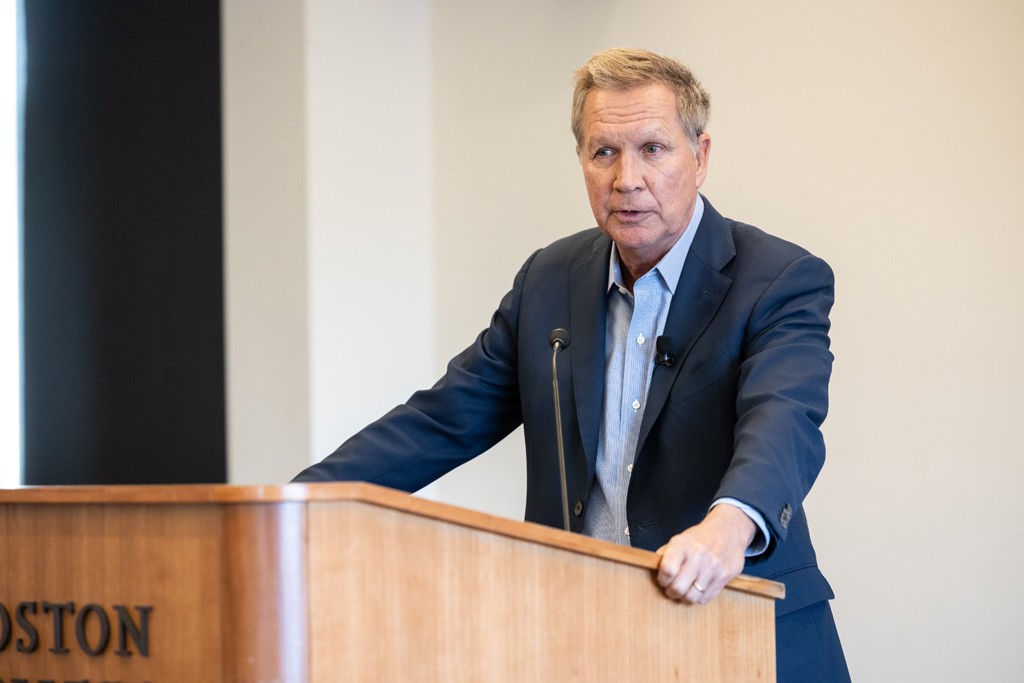Personal Growth and Politics
John Kasich, former Ohio governor and 2016 Republican presidential candidate, stressed the importance of personal growth and evolution. “We love comebacks,” Kasich said. “That’s what it’s all about. So when you get down, and you think, I’m not making any progress, keep going.”
The Clough Colloquium lecture series hosted Kasich after the COVID-19 pandemic postponed his visit for two years, according to Winston Center Director Monetta Edwards. At a pre-event roundtable before Kasich’s speech, a student asked about his 2016 loss in the Republican primary election. Kasich said that former President Donald Trump’s victory was largely due to free publicity from major TV networks. “I never thought in a billion years that Donald Trump would be elected,” Kasich said. “Part of the reason why he was elected is he got a billion dollars worth of free publicity from everybody who wanted to cover him. And they knew it was irresponsible, but as one person said, ‘He may not be good for America, but he’s good for our company.’”
Kasich said that while his presidential run was not successful, he hopes the Republican Party will change its methods and allow more diverse voices. “Right now [the Republican Party] is abysmal because it’s all [about] negativity and trashing the other people, so they are going to have to get their act together,” Kasich said. “If you want to be successful in politics, you have to have ideas. … If all you’re doing is trashing somebody else, it may work for a while, but then it won’t work later.”
Kasich also discussed a recent op-ed he wrote in The Hill, which argued that President Joe Biden’s administration is becoming insular. “Both parties are screwed up, and it’s normally been that way,” Kasich said. “I’m pleased that I endorsed Joe Biden, but I think Joe Biden right now is doing a terrible job. I don’t mean with Ukraine, but a terrible job overall, and [the Biden administration] is way too insulated.”
R. Shep Melnick, the Thomas P. O’Neill, Jr., Professor of American Politics at BC, then introduced Kasich before his main speech. In his introduction, Melnick said that Kasich—a member of the U.S. House of Representatives from 1983 to 2001—shared similarities with former Speaker of the House Tip O’Neill, BC ’36. “Speaker O’Neill and Representative Kasich came from different parties and different generations,” Melnick said. “I doubt they spent much time together. But I [suggest] that the young congressman from Ohio was exactly the type of member of the House of Representatives that Tip could understand, could respect, and could appreciate.”
In his speech, Kasich analyzed Martin Luther King, Jr.,’s legacy, arguing King’s ability to persevere and stand by his beliefs are what make him stand out as an influential historical figure. “I think at the time many of the other people that were around him, they didn’t want him to do this … [yet] he preached, he marched, the dogs were put out on them, they were tear gassed, and [King] said, ‘We’re not going to respond, violence for violence … we’ll lose the high ground.’”
Beyond standing by one’s beliefs, Kasich said that acknowledging one’s mental health is extremely courageous. He used U.S. Olympic gymnast Simone Biles’s departure from the 2020 Tokyo Olympics as an example. “I listened to a guy try to explain to me why Simone Biles was not courageous,” Kasich said. “People are afraid when it comes to the issue of mental health. They think that if they go to get help, they’ll be weak. You know, a person who can admit their weakness is actually strong.”
Kasich concluded with a personal anecdote about finding his faith after he lost his parents in a fatal car crash in 1987. While in the grieving process, he said he was approached by a priest. “He says, ‘You have a window of opportunity to go through that window to figure out where you are, vis-à-vis the Lord.’ … I’ve spent about 35 years of my life trying to figure out [if] there is a God,” Kasich said. “And I’ve come out the other end, hardest for me to say, but for the better, by the grace of God.”
During a question-and-answer period at the end of the event, Kasich said that people must be calm and willing to compromise amid increased political polarization in the twenty-first century. “Don’t take the bait,” Kasich said. “Don’t become one of the blind applicants on one side or the other. Calm things down. … We may have some differences to get over, [but] maybe we can tweak those differences.”
Adapted from The Heights article by Tommy Roche ’25.




